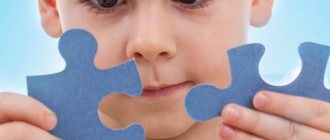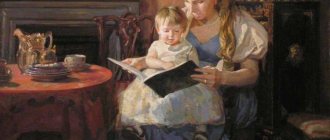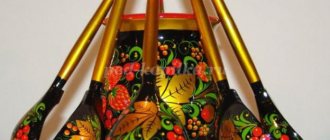Relevance of the project.
In the context of humanization and democratization of society, the problem of tolerance is very relevant, since today the values and principles necessary for common survival and development come to the fore:
- ethics and strategy of nonviolence;
- the idea of tolerance towards foreign and alien positions, values, cultures;
- the need to search for dialogue and mutual understanding, mutually acceptable compromises.
This is due to social problems in society, conflicts on national and religious grounds, which are a direct threat to the security of the country. In Siberia, where people of different nationalities and religious beliefs live, the problem of external and internal migration of the population occupies a special place. Emerging relationship problems can be resolved only by cultivating a tolerant consciousness. Today, hostility, anger, and aggressiveness are becoming increasingly widespread among children and adolescents. There are many reasons for this behavior in children. First of all, it is worth noting the decline in the general level of culture, the mass of negative and often simply aggressive information that falls on the immature psyche of a child from the TV screen or through a computer, social indifference and lack of attention from adults.
The State Concept of Preschool Education states: “In preschool childhood, a child acquires the foundations of personal culture, its basis, corresponding to universal human spiritual values... The formation of the basis of personal culture means that the child is introduced to general, non-transient human values, and not to what can appear valuable to a certain circle of people in a certain region and at certain points in time, joins the universal (universal) means of human life.”
In preschool age, children develop skills of respectful and friendly behavior during relationships with representatives of different cultures, the ability to perceive the environment as the result of cooperation between people of different nationalities and different ethnic origins. They have a positive effect on a person, transform him, elevate him, and return him to a more harmonious state.
The period of preschool childhood is very important for the development of a child’s personality: throughout the entire preschool period, mental functions intensively develop, complex types of activities are formed, and the foundations of cognitive abilities are laid.
Kindergarten, being the first stage in the formation of interpersonal relationships, can and should pay special attention to the problem of tolerance, since it is in childhood that the foundations of human behavior in society are laid. But for this it is necessary to carry out systematic work with all participants in the pedagogical process, create a developmental and learning environment in groups, increase the level of self-awareness and tolerance among educators, preschool specialists, and parents of students.
The diagnostics of parents and kindergarten staff showed a low level of awareness of the problem of tolerance and a low level of national self-awareness. Social problems do not allow parents to pay enough attention to their children - the formation of their worldview. Therefore, one of the main tasks of a kindergarten is to develop in children self-awareness and a tolerant attitude towards the world around them.
Pedagogical ideas for teaching tolerance are contained in the works of many teachers of the past and present. Philosophers, teachers, and scientists interpret the concept of “tolerance” differently, and based on this, the principles of education are determined.
The formation of the foundations of tolerance in preschool children, despite the study of this issue by many famous teachers and scientists, has a number of problems and contradictions. The social order of modern society is focused on a free, independent person who knows how to build relationships with other people and respects their rights and freedoms. However, there are few structured and tested programs and methods for teaching tolerance in preschool age. The possibilities of preschool childhood have been well studied in terms of developing the child’s cognitive and creative abilities, but at the same time, the potential of joint cultural and leisure activities, which could become one of the forms of work to educate a tolerant personality, is not sufficiently used. The family's need for accessible technologies and methods of raising children with a focus on family values and national traditions is not satisfied.
The need to resolve the identified problems in the preschool education system determined the choice of the project topic: “Formation of tolerance in children of senior preschool age.”
Objective of the project:
Creating conditions for the formation in children of senior preschool age of a tolerant attitude towards the world around them.
Project objectives for children:
- Formation in children of senior preschool age the ability to see and understand another person, to show empathy and sympathy for people.
- Formation of tolerant behavior, internal and external legal culture in children.
- Improving the culture of interpersonal interaction among children in the group.
- Strengthening moral ideas and skills of socially acceptable behavior.
Tasks for teachers and parents:
- familiarizing the teaching staff with the latest in methodological literature covering the issues of developing tolerant behavior and communication in children
- increasing the competence of parents on legal issues
- equipping a subject-development environment in groups and in preschool educational institutions that meets the principles of cultural conformity and individuality;
- the use of pedagogical technologies focused on the development of tolerance in working with children;
- interaction between teachers and parents of children in promoting tolerance.
Type of project: creative and research, intergroup, medium duration.
Participants: kindergarten teachers and specialists, parents, children.
Project implementation period: November 2012 – March 2013.
Stage I: Preparatory.
| Develop a work plan for the NDOU on the formation of tolerance for the 2012-2013 academic year | Art. teacher Bowser E.V. |
| Think over and prepare a system of events for Tolerance Week | Creative Group |
| Purchase of educational games, toys, visual demonstration materials, paintings by world artists | Head of the nursery school Dmitrienko T.A. Art. teacher Bowser E.V. |
| Creation of a card index of outdoor games of the peoples of the world | Physical education instructor Ovchinnikova A.V. |
| Familiarization of the teaching staff with the latest in methodological literature covering the issues of developing tolerant behavior and communication in children | Art. teacher Bowser E.V. Teacher-psychologist Kuzminykh E.S. |
| Equipping a subject-development environment in groups and in preschool educational institutions that meets the principles of cultural conformity and individuality | Art. teacher Bowser E.V. Group teachers |
| Reflection of issues and problems of education of tolerance in children in issues of a kindergarten newspaper. | Art. teacher Bowser E.V. Kindergarten teachers |
| Involving parents in the educational process, preparing school-wide and group events on the topic of tolerance. | Head of the nursery school Dmitrienko T.A. Art. teacher Bowser E.V. Group teachers |
| Increasing the competence of parents on legal issues, studying the social status of families of pupils | Teacher-psychologist Kuzminykh E.S. Group teachers |
| Organizing a meeting with Father Vladimir, minister of the Alexander Nevsky Church | Head of the nursery school Dmitrienko T.A. |
II : Project implementation.
Development of a work plan for non-government preschool educational institutions to form the foundations of tolerance in children of senior preschool age.
Development and implementation of Tolerance Week events
from 12 to 16 November
Reading fairy tales of the peoples of the world during the week.
November 12 release of leaflets for parents “Recommendations for parents on tolerant upbringing of children”
Wall newspaper "November 16 - World Tolerance Day"
(responsible: educators)
November 13 “Kids Help Day” - making souvenirs and crafts for children of the first and second junior groups (middle, senior, preparatory groups; responsible: teachers)
November 14 campaign (senior, preparatory group; responsible: educational psychologist)
November 15 Sports festival “Games of different nations”
(responsible: physical education instructor)
Exhibition of children's drawings "My Friends"
(senior and preparatory groups; responsible: educators)
Photo exhibition “We and our little brothers”
(junior, middle groups; responsible: educators).
November 16 Performance “Fly-Tsokotukha” for children of all ages.
Joint holding of events on tolerant mutual understanding with tea drinking “We are different, but we are friendly” (children and parents; in groups;
responsible: educators).
Presentation of the NOD “Travel through the Land of Tolerance” (middle group)
Brief description of the document:
Topic: “Journey through the Land of Tolerance.”
Age group: middle group 4-5 years.
Goal: Formation of a culture of interpersonal relationships between children.
GCD tasks:
Educational:
-Give children an idea of tolerance.
-Expand and consolidate children’s understanding of tolerance.
Educational:
-To form tolerance in children’s thinking and behavior through play activities.
Educational:
— Generalize and expand children’s knowledge about how people should behave towards each other.
— Develop the ability to be attentive, friendly, and friendly.
GCD equipment: audio recording of a locomotive whistle, multi-colored palms for each child, presentation.
GCD move:
Educator: Guys, we have guests today! Let's say hello to them!
But that's not all the guests! Look at the board (slide 1).
The Barboskin family is visiting us!
The Barboskins offer to go on a trip to the country of Tolerance. Do you know such a country? (slide 2)
Before you go to this country, you need to find out what it means. Look at the flower (slide 3)
All leaves are different. Why? (different meaning for each)
I will now read to you the words that are written in the petals of a flower: respect, patience, compassion, forgiveness, kindness, love, mercy.
To ensure that people always remember these words and do good deeds, many countries around the world celebrate the International Day of Tolerance on November 16th. (slide 4)
Educator: Guys, how do you understand our motto: “We are different, but we are together!”? (Children try to express their thoughts). (slide 5)
Educator: I ask the girls to stand up. How smart you are today, what beautiful bows you have. Now please stand up, boys. How strong and courageous you are. I ask the guys who have dark hair to stand up, and now those who have blond hair. Think about what we are like?
(The children try to answer; the teacher leads them to the idea that they are all different, but they go to the same kindergarten, to the same group, they are all equal).
Educator: Yes, guys, you and I really go to the same kindergarten, to the same group, we all love candy, we all love to go for walks, we celebrate holidays together. If people are friendly and do only good deeds, then there will be no dispute in the group, discord in the family, and there will be no war.
A magical train awaits us. (slide 6).
On this journey we will relax, play, and most importantly, learn to be friendly, attentive, and give joy to each other. We get up like a train (music sounds) and set off.
Educator: So we found ourselves in the city of Kindness. (slide 7)
Educator: The main theme of Russian folk tales was and remains the victory of good over evil.
I will name the fairy-tale hero; if he is kind, you clap your hands; if he is evil, you stomp your feet. (Koschey - Immortal, Goldfish, Karabas - Barabas, Little Red Riding Hood, Malvina, Geese-swans, Baba Yaga, Cinderella, Thumbelina, Puss in Boots, Pinocchio, Moidodyr, etc.).
You did everything right. Of course, there are more good heroes.
Educator: Let's go to the next city, Ulybka. (slide I think you will agree with me: if you treat a person with kindness, then he will definitely want to share his smile. Hold hands and say everything together: “We are one family, we are always together!” Smile at the neighbor on the left, and now to the neighbor on the right.
(slide I think you will agree with me: if you treat a person with kindness, then he will definitely want to share his smile. Hold hands and say everything together: “We are one family, we are always together!” Smile at the neighbor on the left, and now to the neighbor on the right.
Let's play, and the game is called: "This is me, this is me, these are all my friends." (if the riddle is about goodness, then the children say in response the words: “This is me, this is me, these are all my friends”; if the riddle is about what cannot be done, the children are silent and wave their hands “no”).
- Who wants to be polite and doesn’t offend kids?
“Who wants to be polite and gives up his seat to an old lady?”
- Who is neat and cheerful and rushes to kindergarten early?
- And on yesterday Monday, who was rude and a slacker?
-Who hurts kids and always prevents them from going for walks?
Educator: We are arriving in the city of Magic Words. (slide 9)
If we complete all the tasks in this city, we will take you to the main square of the country of Tolerance.
Every polite and well-mannered person says words that we call “magic”. With the help of these words, even a sad or offended person can be restored to a good mood.
Let's play the game “Add on.”
- Even a block of ice will melt from a warm word... (Children: thank you).
- The old stump will turn green when it hears... (Children: good afternoon).
- The boy is polite, understanding, he speaks when meeting... (Children: hello).
- When we are scolded for pranks, we say: ... (Children: forgive me, please).
- Everywhere and everywhere they say goodbye... (Children: goodbye).
Educator: Becoming polite is not easy, but it is very important!
Man is born and lives on Earth to do good. We must stick together, take care of each other, give smiles, say kind words.
So we found ourselves on the main square of Tolerance! Look carefully, what does the circle mean? Palms?
I suggest you all make a symbol of tolerance together!
(select palms and stick them around the ground).
I would like to end our journey with the words: “If everyone is tolerant of each other, we will make our world tolerant together!”
Educator: Our journey has ended, it’s time to return to kindergarten. (children take the symbol of Tolerance, become a train and return to kindergarten).
Implementation of the project in educational areas:
Children's Day
(socialization, communication, artistic creativity, cognition, work, safety)
Promotion “Sending Greetings”
(socialization, communication, cognition, artistic creativity, labor)
Sports festival
"Games of different nations"
(physical culture, health, cognition, communication, socialization, safety)
Reading fairy tales of the peoples of the world, works of Russian and foreign writers
(fiction, cognition, socialization, communication)
Exhibition of children's drawings "My Friends"
(artistic creativity, communication)
Photo exhibition “We and our little brothers”
(artistic creativity, socialization, communication, cognition, safety)
Performances “Fly-Tsokotukha”, “Kolobok in a new way”
(socialization, communication, cognition, fiction)
Preparation of the performance
“The New Adventures of Little Red Riding Hood” and the festival of theatrical mini-productions “Theatrical Kaleidoscope”
Conducting workshops for teachers “Issues of developing tolerance in preschool practice”
Working with parents:
Production of folders “Rights and Responsibilities of Adults and Children”, brochures, wall newspapers, memos and recommendations for cultivating a tolerant attitude towards the world around us.
Meeting and conversation with Father Vladimir, a minister of the Alexander Nevsky Church.
Organization of joint activities, tea parties with parents.
III : Presentation of the project.
Presentation “Pedagogy of Tolerance”
Abstract
Pedagogy of tolerance
Modern society, with its informationization and stress, is increasingly characterized as a society of increased aggressiveness.
Cartoons, action films and thrillers, detective stories, computer games - everything that modern children are surrounded by and with which they fill their leisure time is imbued with aggression. Therefore, at present, the topic of teaching tolerance is extremely relevant in modern preschool educational institutions.
Children belonging to different ethnic groups and confessions (religions) come to kindergarten, so preschool teachers solve the following problem: to teach tolerance. And this means preparing students for life, for communicating with many other, very different people.
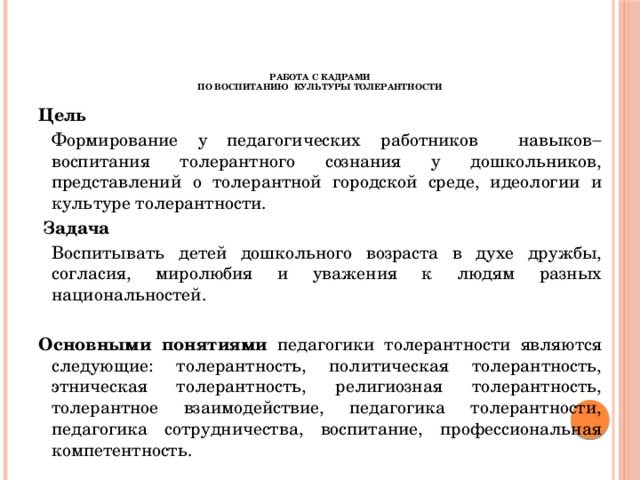
Working with personnel
to foster a culture of tolerance
Goal
Formation of skills among teaching staff - education of tolerant consciousness in preschool children, ideas about a tolerant urban environment, ideology and culture of tolerance.
Task
Raise preschool children in the spirit of friendship, harmony, peacefulness and respect for people of different nationalities.
Basic concepts
pedagogies of tolerance are the following: tolerance, political tolerance, ethnic tolerance, religious tolerance, tolerant interaction, pedagogy of tolerance, pedagogy of cooperation, education, professional competence.
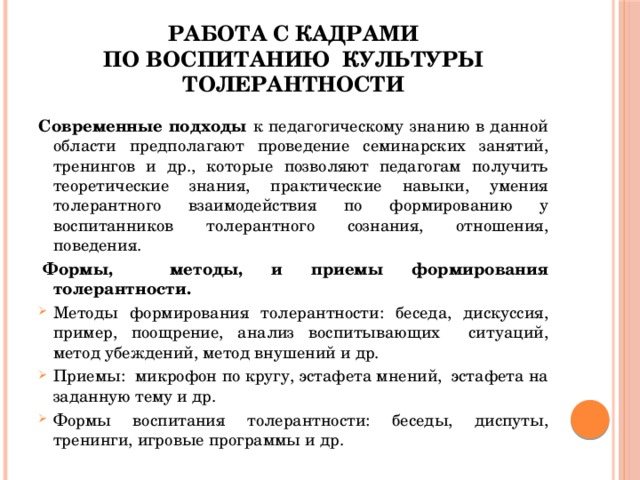
Working with personnel
to foster a culture of tolerance
Modern approaches
Pedagogical knowledge in this area involves conducting seminars, trainings, etc., which allow teachers to gain theoretical knowledge, practical skills, and the ability to interact tolerantly to develop a tolerant consciousness, attitude, and behavior in students.
Forms, methods, and techniques for developing tolerance.
- Methods for developing tolerance: conversation, discussion, example, encouragement, analysis of educational situations, method of persuasion, method of suggestion, etc.
- Techniques: microphone in a circle, opinion relay, relay on a given topic, etc.
- Forms of tolerance education: conversations, debates, trainings, game programs, etc.
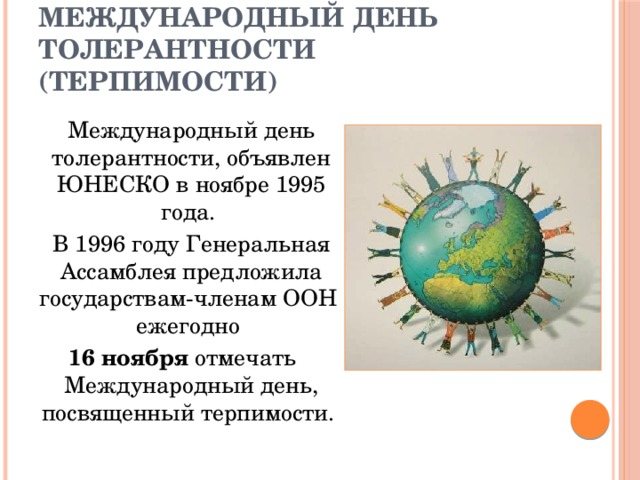
International Day of Tolerance (Tolerance)
International Day of Tolerance, declared by UNESCO in November 1995.
In 1996, the General Assembly proposed that UN member states annually
November 16
celebrate the International Day for Tolerance.
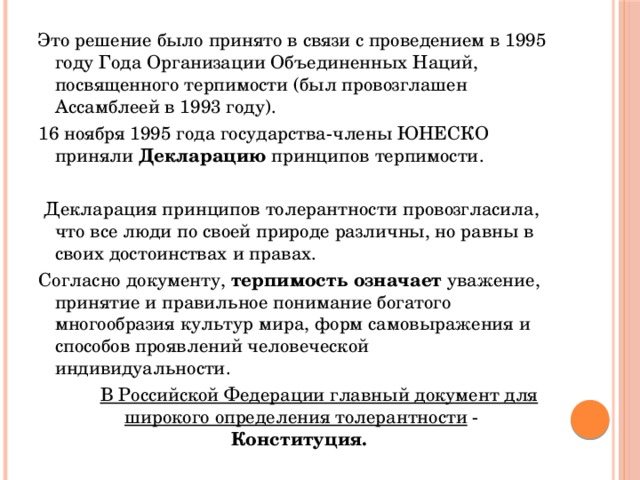
This decision was taken in connection with the 1995 United Nations Year for Tolerance (proclaimed by the Assembly in 1993).
On November 16, 1995, UNESCO Member States adopted the Declaration
principles of tolerance.
The Declaration of Principles of Tolerance declared that all people are different by nature, but equal in their dignity and rights.
According to the document, tolerance means
respect, acceptance and proper understanding of the rich diversity of the world's cultures, forms of self-expression and ways of expressing human individuality.
In the Russian Federation, the main document for a broad definition of tolerance is the Constitution.
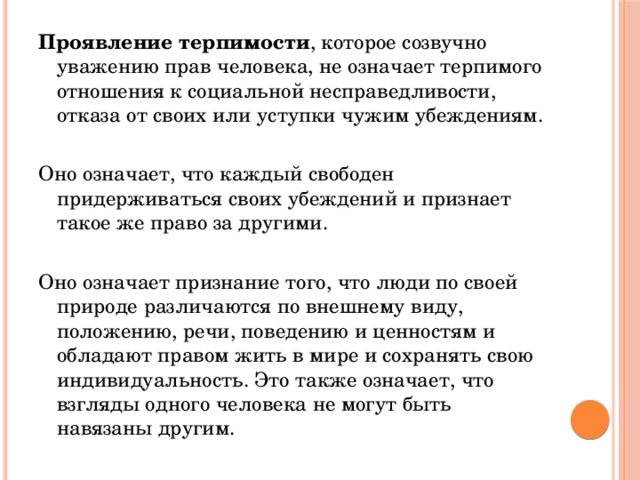
Showing tolerance
, which is consonant with respect for human rights, does not mean a tolerant attitude towards social injustice, abandonment of one’s own or concession to others’ beliefs.
It means that everyone is free to hold their own beliefs and recognizes the same right for others.
It means recognizing that people by nature differ in appearance, attitude, speech, behavior and values and have the right to live in the world and maintain their individuality. This also means that one person's views cannot be imposed on others.
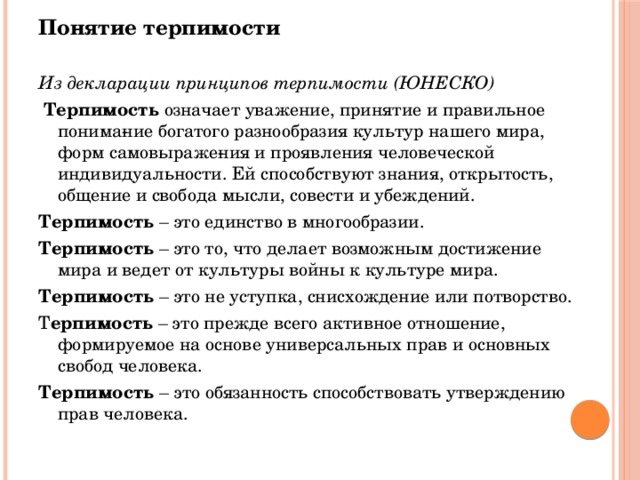
Concept of tolerance
From the Declaration of Principles of Tolerance (UNESCO)
Tolerance
means respect, acceptance and proper understanding of the rich diversity of our world's cultures, forms of self-expression and manifestation of human individuality. It is promoted by knowledge, openness, communication and freedom of thought, conscience and belief.
Tolerance
– this is unity in diversity.
Tolerance
is what makes peace possible and leads from a culture of war to a culture of peace.
Tolerance
– this is not a concession, condescension or indulgence.
Tolerance _
- This is, first of all, an active attitude formed on the basis of universal human rights and fundamental freedoms.
Tolerance
is a responsibility to promote human rights.
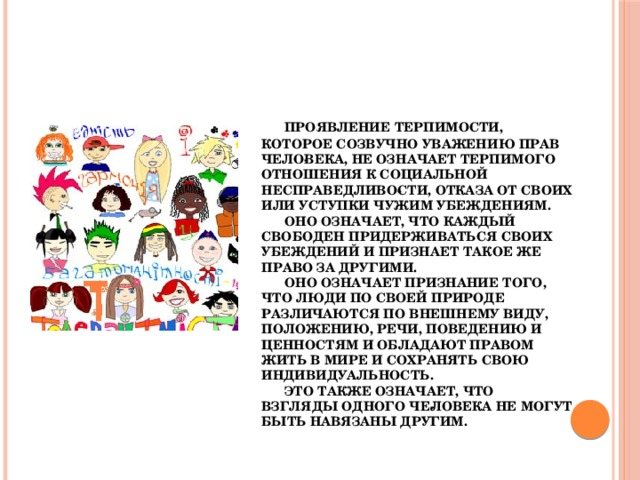
The manifestation of tolerance, which is consonant with respect for human rights, does not mean tolerating social injustice, abandoning one's own or yielding to other people's beliefs.
It means that everyone is free to hold their own beliefs and recognizes the same right for others. It means recognizing that people by nature differ in appearance, attitude, speech, behavior and values and have the right to live in the world and maintain their individuality. This also means that one person's views cannot be imposed on others.
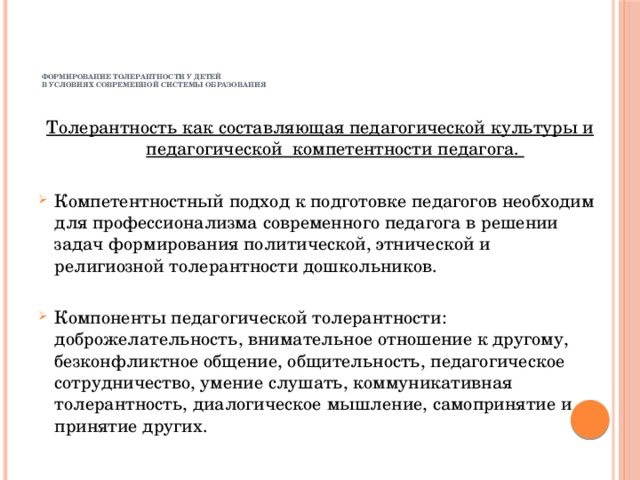
Formation of tolerance in children
in the modern education system
Tolerance as a component of pedagogical culture and pedagogical competence of a teacher.
- A competency-based approach to teacher training is necessary for the professionalism of a modern teacher in solving the problems of developing political, ethnic and religious tolerance in preschoolers.
- Components of pedagogical tolerance: goodwill, attentive attitude towards others, conflict-free communication, sociability, pedagogical cooperation, listening skills, communicative tolerance, dialogical thinking, self-acceptance and acceptance of others.
Practical lesson “Pedagogy of balloons”
Target:
Foster respect for the national cultures of different peoples; to instill in children pride in the uniqueness of their national culture.
How many different peoples live on Earth? Great multitude. Almost all corners of our planet have been explored and inhabited.
There are a variety of children living on our planet. Children with red, yellow, white and black skin... children with almond-shaped and slanted eyes, children with straight and curly hair... children who have a lot of things at their disposal and children who have nothing... children whose home is the rainforest South America and the jungles of Africa, and children living in the skyscrapers of megacities.
Billions of boys and girls, similar and completely different, play, chat, laugh, cry, eat (but there are also those who, unfortunately, have nothing to eat), celebrate birthdays, watch nature, and some work.
Although children of different nations are not alike, they all need the same thing: to be loved and cared for, to have a home, family, true friends, food, clothing, the opportunity to go to school and... a little space for Game!
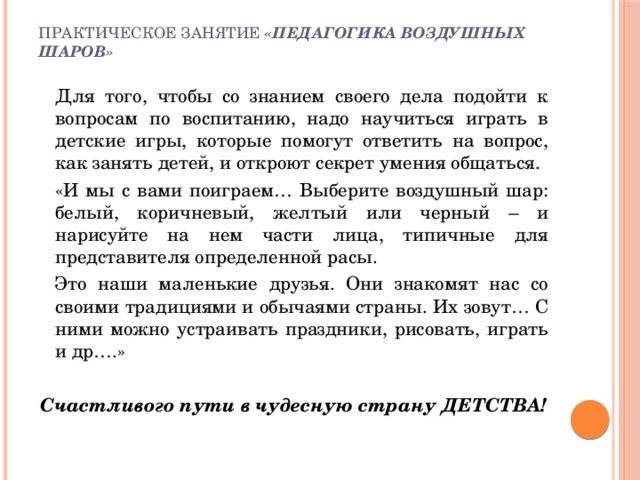
Practical lesson “Pedagogy of balloons”
In order to approach parenting issues competently, you need to learn how to play children's games that will help answer the question of how to keep children occupied and reveal the secret of the ability to communicate.
“And we’ll play with you... Choose a balloon: white, brown, yellow or black - and draw on it parts of the face that are typical of a representative of a certain race.
These are our little friends. They introduce us to their traditions and customs of the country. Their name is... You can organize holidays with them, draw, play, etc...."
Have a safe journey to the wonderful land of CHILDHOOD!
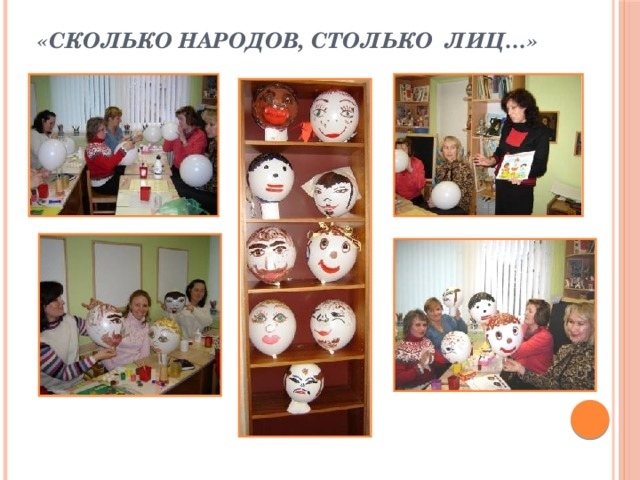
“So many peoples, so many faces...”
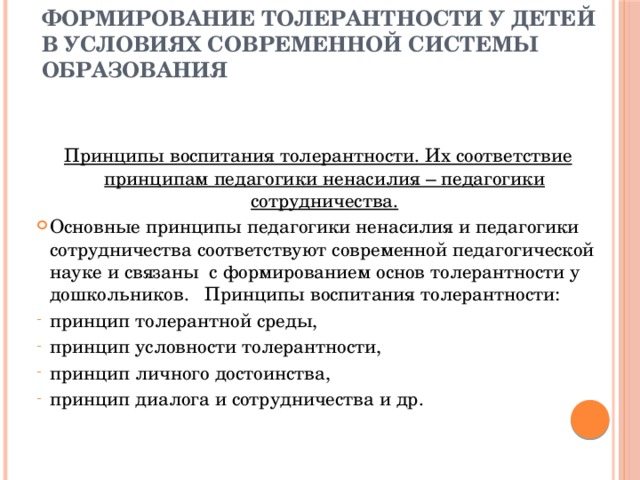
Formation of tolerance in children
in the conditions of the modern education system
Principles of education of tolerance. Their compliance with the principles of pedagogy of non-violence - pedagogy of cooperation.
- The basic principles of non-violence pedagogy and cooperation pedagogy correspond to modern pedagogical science and are associated with the formation of the foundations of tolerance in preschoolers. Principles of tolerance education:
- principle of a tolerant environment,
- principle of conditional tolerance,
- the principle of personal dignity
- the principle of dialogue and cooperation, etc.
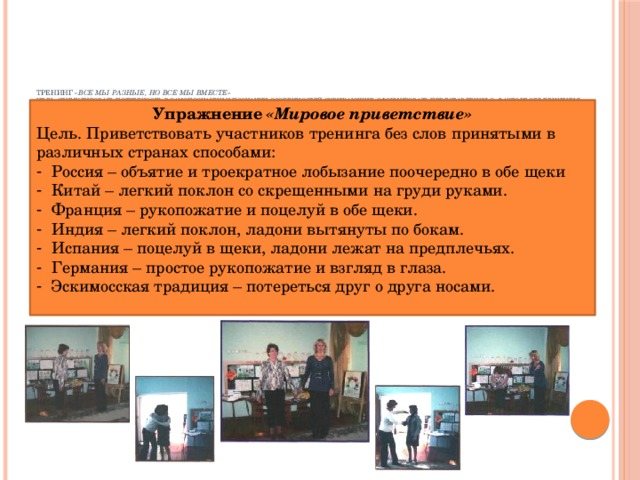
Training “We are all different, but we are all together”
Goal: to stimulate the need for self-knowledge and knowledge of the characteristics of others, to form ideas about the “unification factor” of this group, tolerance towards oneself and employees
Exercise
“World greeting”
Purpose. Greet training participants without words in ways accepted in various countries:
- Russia – hug and three kisses alternately on both cheeks
- China - light bow with arms crossed on the chest.
- France – handshake and kiss on both cheeks.
- India – light bow, palms extended to the sides.
- Spain – kiss on the cheeks, palms on forearms.
- Germany - a simple handshake and a look in the eyes.
- The Eskimo tradition is to rub noses against each other.
Training “The Power of Tolerance”
Goal: Develop skills of pedagogical tolerance
Exercise
“General Rhythm”
Purpose: increasing group cohesion.
Participants stand in a circle. The leader claps his hands several times at a certain speed, setting a rhythm that the group must maintain as follows: the participant standing to the right of the leader makes one clap, followed by the next, etc. It should feel as if one person is clapping at a given rhythm, and not all members of the group in turn. This exercise rarely succeeds the first time. After several trial laps, participants who disrupt the general rhythm gradually drop out of the game.
Modification of the exercise. The presenter beats out some simple musical phrase with his hands. Then everyone repeats it in turn (the whole group can simultaneously beat out the rhythm).
Exercise
“Acoustics”
Participants sit silently in a circle. Closing their eyes, they first concentrate their attention on the sounds coming from outside - from the corridor, from the street. After 1-2 minutes the presenter asks what they heard. Then they close their eyes again and concentrate on the sounds inside the room. After 1-2 minutes, the presenter asks them again what they heard.
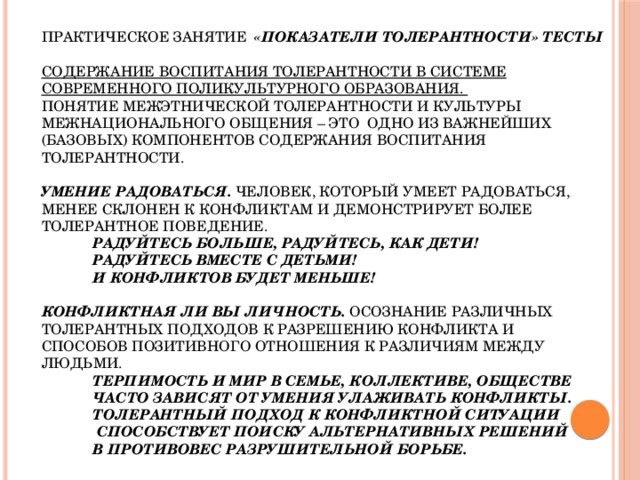
Practical lesson “Indicators of tolerance” tests
The content of tolerance education in the system of modern multicultural education.
The concept of interethnic tolerance and the culture of interethnic communication is one of the most important (basic) components of the content of tolerance education. The ability to rejoice.
A person who knows how to rejoice is less prone to conflicts and demonstrates more tolerant behavior.
Rejoice more, rejoice like children! Rejoice with your children! And there will be fewer conflicts! Are you a conflict person?
Awareness of different tolerant approaches to conflict resolution and ways to deal positively with differences between people.
Tolerance and peace in the family, team, and society often depend on the ability to resolve conflicts. A tolerant approach to a conflict situation promotes the search for alternative solutions as opposed to a destructive struggle.
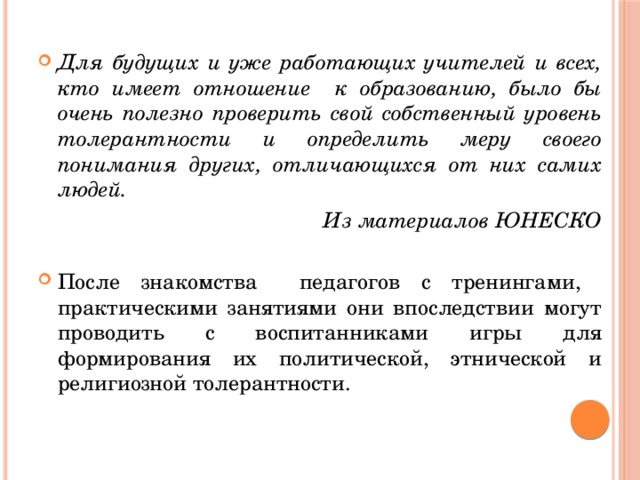
- It would be very useful for future and existing teachers and everyone involved in education to test their own level of tolerance and determine the extent of their understanding of others who are different from themselves.
From UNESCO materials
- After teachers become familiar with trainings and practical exercises, they can subsequently conduct games with students to develop their political, ethnic and religious tolerance.
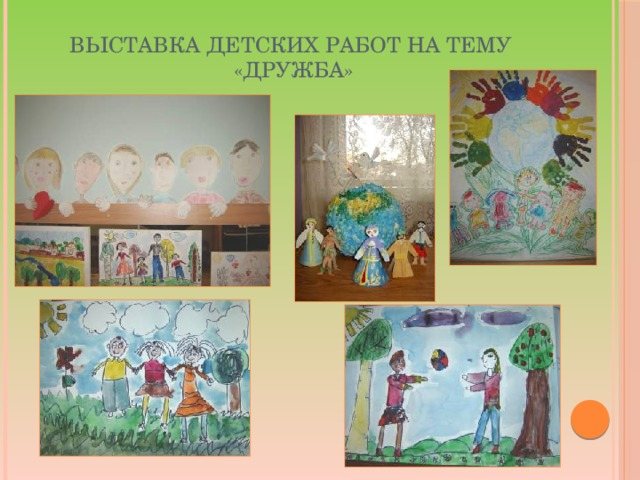
Exhibition of children's works on the theme “Friendship”
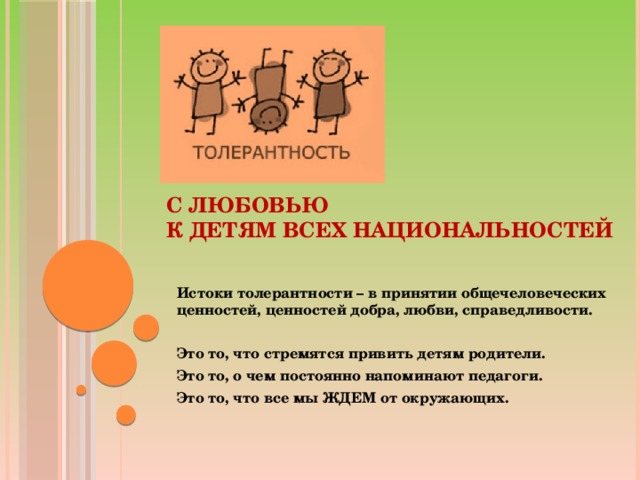
With love
for children of all nationalities
The origins of tolerance lie in the acceptance of universal human values, the values of goodness, love, and justice.
This is what parents strive to instill in their children.
This is what teachers constantly remind us of.
This is what we all EXPECT from others.
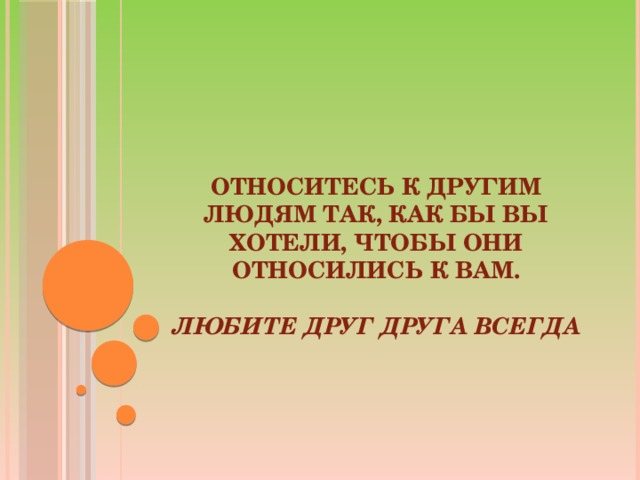
Treat other people the way you would like to be treated.
Love each other always
Presentation of the project at a meeting of teachers
Conducting a festival of theatrical mini-productions
“Theatrical Kaleidoscope” for children of kindergartens No. 163 “Harmony”, No. 164 “Fairy Tale” of Russian Railways JSC and parents of pupils
Work results:
- Increasing the pedagogical competence of kindergarten teachers and specialists.
- Compiling a card index of outdoor games, sports festival scenarios, and leisure activities with parents.
- Improving the legal and pedagogical culture of parents (moving folders, memos and recommendations for promoting tolerance).
- Development of creative abilities of kindergarten students and teachers, their communication skills.
- Strengthening the cooperative relationship between the kindergarten and the parents of the pupils.
